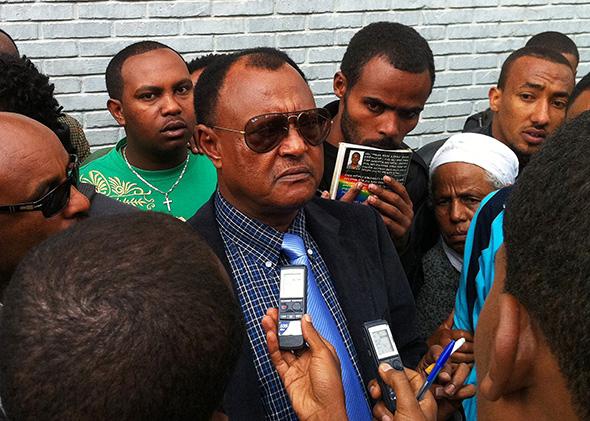In July 2012, an Ethiopian court charged the prominent journalist Eskinder Nega with conspiring to commit terrorist acts. He was sentenced to 18 years in prison under a broad and ill-defined law. His crime? Writing about the Arab Spring and calling for peaceful protests.
A frequent critic of the government and a prominent journalist, Nega was no stranger to detention. But these charges were the most severe—and the corresponding sentence the longest—he’d ever received. Appeals to regional bodies, findings by the United Nations that his detention violates international law, and a litany of international journalism awards all underscore the politically motivated charges that keep him behind bars.
Sadly, he’s not alone.
Since Nega’s detention, Ethiopia has taken a far more repressive turn. At least 19 other Ethiopians are languishing in prison on trumped-up charges for exercising their right to free expression. During the past year alone, six privately owned media outlets have shut down due to ongoing government harassment. At least 22 journalists and bloggers have faced criminal charges for doing their jobs, while nearly 30 more have left the country—preferring exile to the constant threat of arrest.
The authorities in Addis have never been tolerant of an open media environment, but the political climate has deteriorated dramatically. Even the upcoming elections, scheduled for May 24, have not generated the opportunities for reform some analysts had originally anticipated. Instead, this Sunday’s elections are likely to reinforce the country’s repression.
In the grand scheme, clamping down on the media was almost unnecessary given how tightly the ruling party holds power: It won 99.6 percent of the parliamentary seats in 2010. Independent and critical voices are virtually nonexistent as nongovernmental organizations, which often play a key monitoring role during election periods, have been virtually gutted by not just the anti-terrorism law, but also the Charities and Societies Proclamation—a bill that has cut civil society off at the knees by dramatically limiting its access to foreign funding.
After Ethiopia’s 2010 elections, the United States expressed serious concern about the country’s political trajectory. Since that time, however, the Obama administration has plowed ahead with other imperatives—such as a common development agenda to bolster Ethiopia’s economy and a bevy of regional security initiatives. The repressive domestic environment has been treated as an ancillary problem—or ignored entirely—because, it seems, it is just too difficult to reconcile with the positive narrative on economic growth and development. Indeed, U.S. support for Ethiopia’s development has now reached some $500 million in annual aid while collaboration on regional diplomatic initiatives and peacekeeping missions blossoms.
As the U.S.–Ethiopian alliance continues to grow, the administration’s reluctance to take a tougher stance in support of independent and critical voices sends a troubling message. On April 16, Under Secretary of State Wendy Sherman suggested that Addis had made great progress, saying “Ethiopia is a democracy that is moving forward in an election that we expect to be free, fair, and credible and open and inclusive.” She continued: “[E]very time there is an election it gets better and better.”
Ethiopia’s Foreign Affairs Ministry quickly posted her comments to its Facebook page, twisted them further in a summary of her visit on its official website, and played them repeatedly on state radio. Sherman’s remarks confirmed the image Ethiopia has sought to promote, even though it is one of Africa’s most undemocratic countries.
“Messages about [basic rights] aren’t always as clearly stated as other issues that come up,” said a senior U.S. government official at a recent closed-door meeting on Ethiopia. But the strategic imperative for the United States to promote human rights and the rule of law alongside everything else is vital to stave off the potential for future instability. Ethiopia’s economic growth may look good in the short term, but more than a decade ago the World Bank made clear that these gains alone cannot bring about stability. Indeed, governments that neutralize threats, perceived or real, with repressive tactics often end up fueling violence and militancy, thereby squandering their economic progress.
In early 2015, Secretary of State John Kerry made clear that “[e]ach day, American diplomats make known … our backing for the right of people to speak, publish, broadcast, blog, tweet, and otherwise express themselves openly and without fear and without retribution.” In April, the administration opened its fourth annual “Free the Press” campaign by highlighting the case of Reeyot Alemu, a former freelance journalist and teacher in Ethiopia who remains imprisoned on terrorism charges because she wrote a piece critical of fundraising efforts for a national dam project. On World Press Day, Lily Mengesha, who was detained by the Ethiopian authorities for highlighting the problem of child brides, sat with President Obama at his press conference.
The May 24 elections present an important opportunity for the United States to make good on this rhetoric and photo-ops by revising its approach toward Ethiopia. The Ethiopians should be urged to release or pardon wrongly imprisoned journalists as a signal that at least some criticism and dissent will be tolerated. In the aftermath of the elections, the Obama administration should press the new government to revise the draconian legislation that has gutted the media and civil society so severely. The administration needs to show once and for all it is willing to stand with the many Ethiopians who believe their country is moving in the wrong direction—but are too afraid to speak out.
